If there’s one thing War Party strives for, it’s reinvention. Fun fact: The band started out as a duo, with frontman/guitarist Cameron Smith backed by drummer Peter Marsh playing open-mics at the now-obliterated dive-bar-cum-live-music-club The Grotto. Smith, who started out as the lead screamer for a hardcore band called Decades, was eager to move past punk rock, and he had written some songs that gave his old act’s aggressive breakdowns a wide berth. Yet before the end of that year, the duo expanded into a full band with the addition of Big Fiction’s Ricky Williford on lead guitar and trumpet and Smith’s Decades bandmate Tyler Moore on bass, both of whom were also stepping away from their time in the hardcore scene. War Party’s original sound, debuted at live shows and across a few cassette singles and the band’s first album, 2013’s Tomorrow’s a Drag, drew local crowds with a raw mélange of beer-filtered reverb rock and ’60s doo-wop ideas, roughly fitting into the tail end of the garage-rock revival that swelled and crested in the mid-to-late aughts and washed into the early part of this decade in waves of interchangeable Burger Records bands. A couple more singles and an EP followed, and then the guys added Chris Waldon on keyboards, which marked a songwriting period in which the vibe of doo-wop (or “don’t-wop,” as Williford liked to say) sort of atrophied and disappeared. Pretty soon, calling War Party “garage rock” didn’t seem to make sense, especially when Waldon added trombone to the mix.
Over the past four years, the band has continued to write, record, go on the occasional multi-state van adventure, and push against the expectations and confines of genre boilerplates — they’re difficult to pigeonhole, in other words. On Friday, the War Party guys activate the digital version of their newest album, a 12-song collection of introspective, post-punk pop. To my ears, Pure Destroyer is War Party’s best, most thoughtfully written record yet. And according to Smith, it’s also probably their last.
*****
That sounds kind of dramatic, but consider these facts: War Party has been a band for seven years, and Pure Destroyer took two years to finish. Ask veterans of the Amplifier Wars, and they’ll tell you that the combination of extended duration and prolonged album gestation can wear on any band — playing music, even at the best of times, is a lot of work. The highs are great, but they’re almost always tempered by the lows, and periods of inactivity (like when your recording process goes long) can easily generate stagnation and flagging interest. If you’re a musician without a lot to do, idle hands are less the devil’s workshop and more an invitation to stare into the abyss of self-reflection. Or side-projects.
If you’re a fan of War Party, you can probably see where I’m headed with this, but for the ones in the back who carry only a passing familiarity with the band, War Party is not Cameron Smith’s only musical outlet. Since about 2015 or so, Smith has been performing as Sur Duda, a moniker that gives him an outlet for the songs he writes that aren’t the right fit for his main band.
Halfway through recording Pure Destroyer – as he was also recording Sur Duda’s debut full-length, Paper Knife – Smith said he had an epiphany: “I figured out that War Party is where all the aggressive stuff goes, and all the flowery, pretty stuff goes into Sur Duda.”
But Smith isn’t the only War Partier with other gigs. In the time it took to complete Pure Destroyer, Williford joined Joe Gorgeous (songwriter Joey Gorman’s post-Longshots punk outfit) on lead guitar. Waldon started an electro duo called Starbass Laboratories with his friend Peter Gilliland. Marsh played drums for Sur Duda and in random pick-up gigs. War Party, along with saxophonist Ben Marrow, was also the initial backing band for ’70s AM-gold-influenced pianistic singer-songwriter Andy Pickett. Moore and Waldon bowed out in January, but Marsh, Smith, and Williford remained in Pickett’s band until a few weeks ago. But Moore took on the most time-intensive gig of all of them. He rebooted his college career by enrolling at Texas Wesleyan University, which also included joining the school’s Army ROTC program.
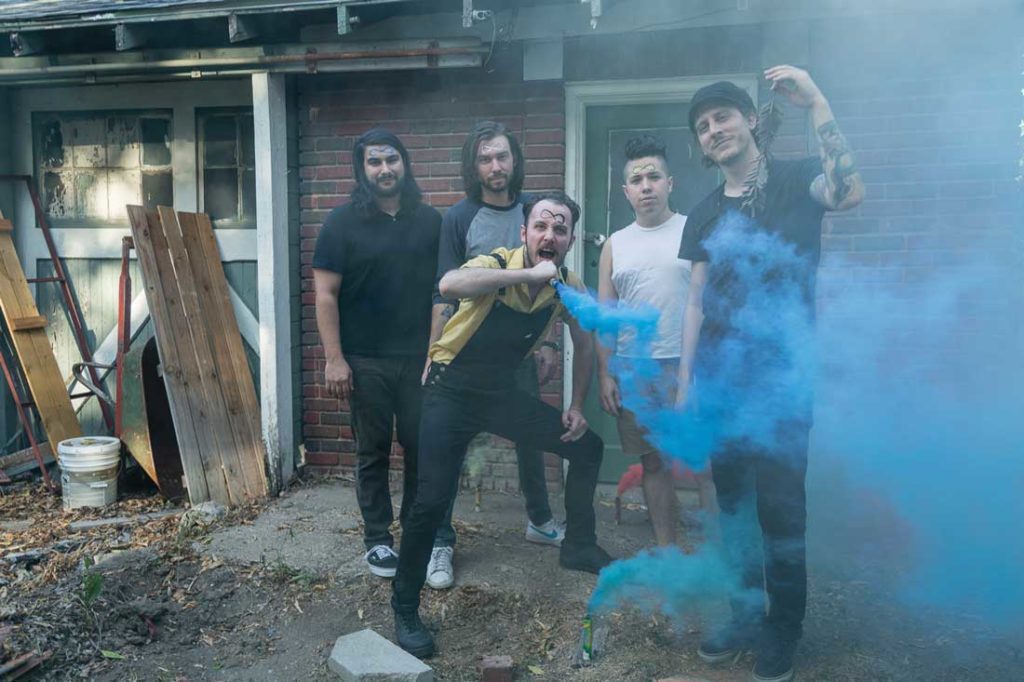
Moore earned his degree and is currently finishing up basic training in Fort Benning, Georgia, and was unable to be interviewed with the rest of the guys at a local venue recently, but, ultimately, he has left the band. It’s hard to play shows when you’re in another state, tramping full-time through woods and swamps doing combat training. His last show with War Party was in February. Though replaced on bass by multi-instrumentalist Jesse Gage, Moore’s role in and departure from the band were profound. Per the cryptic, ominous “final War Party album” verbiage above, his leaving was essentially the end of an era.
Though Smith has always been War Party’s principal songwriter, Moore has written the second-most of the band’s material. He contributed two to Pure Destroyer: “Where I’m Calling From” and the album-closing “Racoon Song.” Pure Destroyer, then, is sort of a final chapter of a song cycle begun way back when. Smith calls it Moore’s farewell album. “He and I have been in bands together since I was 17, so 11 years,” Smith said. “A lot of the tones, even on my songs, are trying to do things that he was really interested in, that kind of New Order, New Wave shit or whatever.”
Mixed with Waldon’s synth pads and keyboard runs, Moore’s melodic, chorus effect-covered bass lines do evince the influence of post-punk, New Wave, and ’80s Brit-pop. “I was thinking The Cars, Pulp,” Smith said. “There are parts that are really post-punk influenced –– ‘No Exit,’ for example, [and] ‘Bottles of Glass’ –– I was listening to a lot of Wire when I wrote that.”
You then might say that War Party’s sound has sort of fast-forwarded in its progenitors, starting with a ’60s pop skeleton and increasing in sophistication along the sonic signifiers of the Reagan-Thatcher years to reach the point of Pure Destroyer’s completion. But the musicians also changed as people.
“What was weird about this record that I don’t think was the case previously was that priorities were different,” Williford said. “For instance, [Moore] was having to wake up every morning at 5 a.m. and go run and shit [for his ROTC program]. He had a full plate, and he was going to school. And I was transitioning into taking on more responsibilities at my job.”
Smith noted the significance of the album’s title in relation to the end of Moore’s influence on the band. It’s also the end to a lot of other things.
“I think that the song [‘Pure Destroyer’] itself is like trying to kill off the bad shit you don’t like in yourself,” Smith said, “and it’s fitting because that seems to be the struggle that all of us were going through: quitting something, giving something up.”
And moving on to the next thing. Besides finishing school and joining the army, Moore experienced the tragic passing of his father, but he also got engaged. So did Smith, and Williford also married. To paraphrase Blink-182, Pure Destroyer is about people growing up. Smith said the first of Moore’s Destroyer songs, ‘Where I’m Calling From,’ is kind of about that. Part of the chorus includes “Can you tell me what matters? / Will sacrifice help unchain me?”
“It was almost an elephant in the room,” Williford said of Moore’s impending exodus. “He was working through some stuff in the song, and I’m happy and proud of him for doing that.”
Of Moore’s other song, Smith said he could tell Moore was experiencing some heavy feelings. “I think with ‘Racoon Song,’ too, it took him a long time to finish writing the words and recording the vocals, and a part of me felt like he was trying to put it off because it was his last thing.”
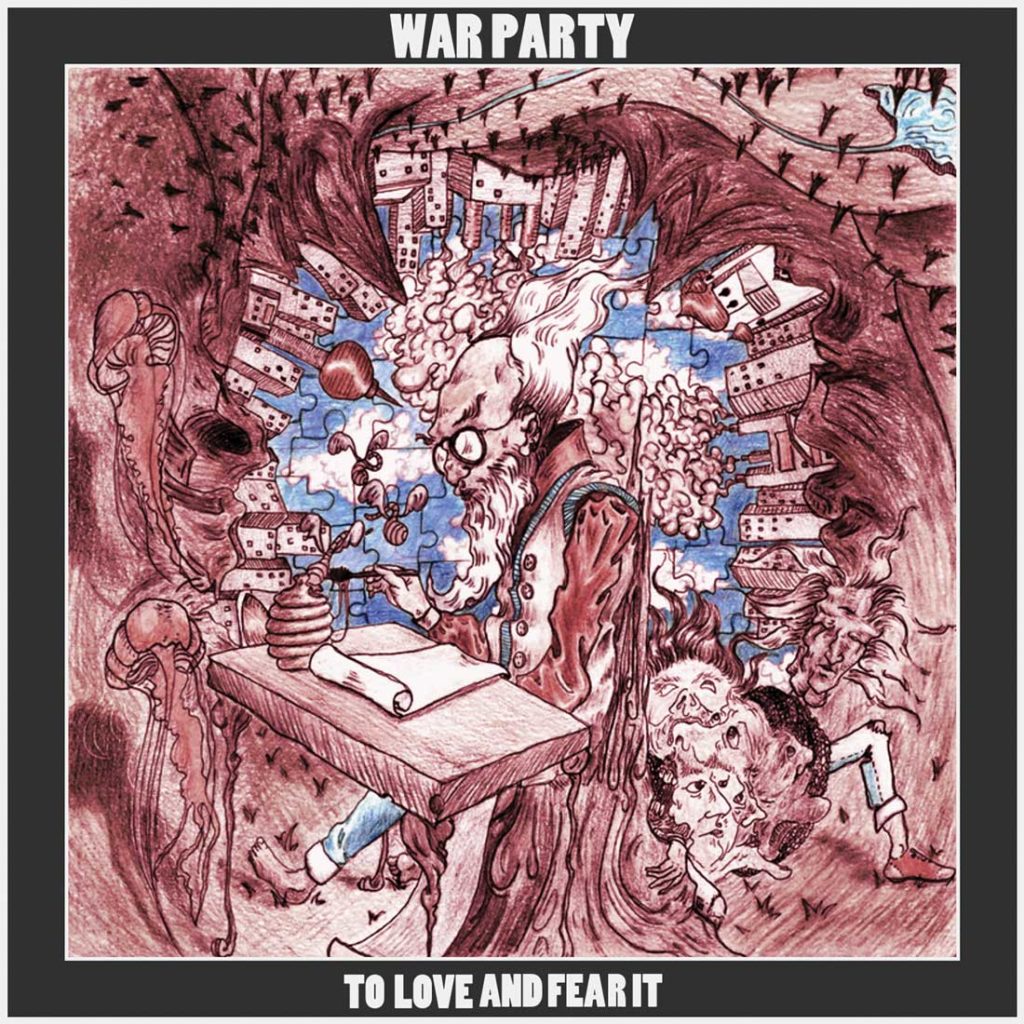
*****
Yet for all the life events and massive changes affecting its personnel, War Party soldiered on through the recording process, forcing itself to update and evolve. Three of the songs (the title track, “Little Vows,” and “Where I’m Calling From”) were produced by Kopecky Family Band’s Markus Midkiff at Cloudland Recording Studio, where Cloudland owner Britt Robisheaux produced the other nine, with the whole thing mastered by Fort Worth Grammy winner Jordan Richardson (Ben Harper) at Electric Barryland (Son of Stan, Oil Boom) in North Fort Worth. His production process, the band said, was a welcome change. As a producer, his technical experience and gear knowledge proved to be a huge boon. “He spoke keyboard to me,” Waldon joked.
Midkiff introduced a Teenage Engineering OP-1 synthesizer to their recording process, and that device offered a new way of arranging songs. “Basically, instead of doing everything to click tracks, we would make a beat on [the OP-1] and then record to that drum-machine beat and then build the track that way and then make this little sonic block and strip pieces of it away,” Smith said.
The band continually tinkered with the songs, and they finished the final song, Moore’s “Racoon Song,” a mere two months ago.
Williford said the band has since altered its approach to writing music entirely. Smith, he said, “would come to practice and be like ‘Hey, here’s a song idea, and this is how I think it should sound,’ and we would inevitably fail at making it sound that way, and somewhere in between, we’d compromise, but I think now there’s a lot more of ‘Let’s put a drum track down and write it together. Let’s influence each other and tell each other honestly if it sounds like shit.’ I think we’ve got a point in our relationship where we can say that and not take it personally. Pure Destroyer is definitely the last semblance of how we were doing things. There’s still a semblance of doing things with [Midkiff] in that aspect.”
“But we learned a lot from that and also from doing [Pickett’s] shit,” Smith said.
Williford nodded. “Playing music with [Pickett], it was like ‘Try not to blow your load so fast. Calm down. Less is more.’ Having that time with [Pickett] gave me insight into how someone like that writes music.”
So while Pure Destroyer is indeed an end, it’s not the end.
“We’re not breaking up or anything, but it’s probably the last War Party record,” Smith said.
I asked them if they were going to reconvene under a new name.
“That’s too much information to give you at this time,” Williford said, half-jokingly but perhaps not.
“We’re not really changing the name, either,” Smith said, “but we’re gonna change a little bit. When [Moore] left, I think all of us weren’t sure if we were gonna keep going. We weren’t really sure if we should, even though [Moore] said he was cool with us. But I guess, when [Gage] started playing with us, we were all, ‘Oh, this is fun again.’ ”
Williford said it wasn’t that anyone in the band disliked playing, but after seven years of doing anything, it’s hard to avoid the sense of going through the motions.
“I think it was like senioritis leading up to [Moore’s] leaving,” Smith said.
Gage used to play drums in slacker-rock outfit Movie the Band, and he’s also a busy songwriter himself, writing and recording his own pop-punk-influenced material and playing with Williford and guitarist Mandy Hand in the indie-rock trio Big Heaven. He also recently has jumped on guitar for Bitch Bricks. Watching Gage play with them at a recent show at Three Links, I could tell that he has rejuvenated War Party’s old material and fired them up to write new stuff. He bounces around between Smith, Waldon, and Williford like a mohawked pinball, practically ricocheting around the stage, hopping, jumping, landing on his knees, crashing onto his back, visibly having a blast hammering away at his bass. And that energy is informing what War Party does next.
“We want to write stuff that feels the way playing songs live with [Gage] feels,” Smith said. “All of [our previous] stuff is sort of slowed down, but then when we started playing with him, we started writing more aggressive, higher-energy stuff that’s decidedly more punk.”
The irony is not lost on Smith.
“What was funny, for the first few years, people were like, ‘Oh, you guys are a punk band,’ and I was always, ‘No, we’re fucking not! I just got done being in a punk band!’ This was supposed to not be a punk band … and now I’m like, ‘OK, we’re a punk band now.’ ”
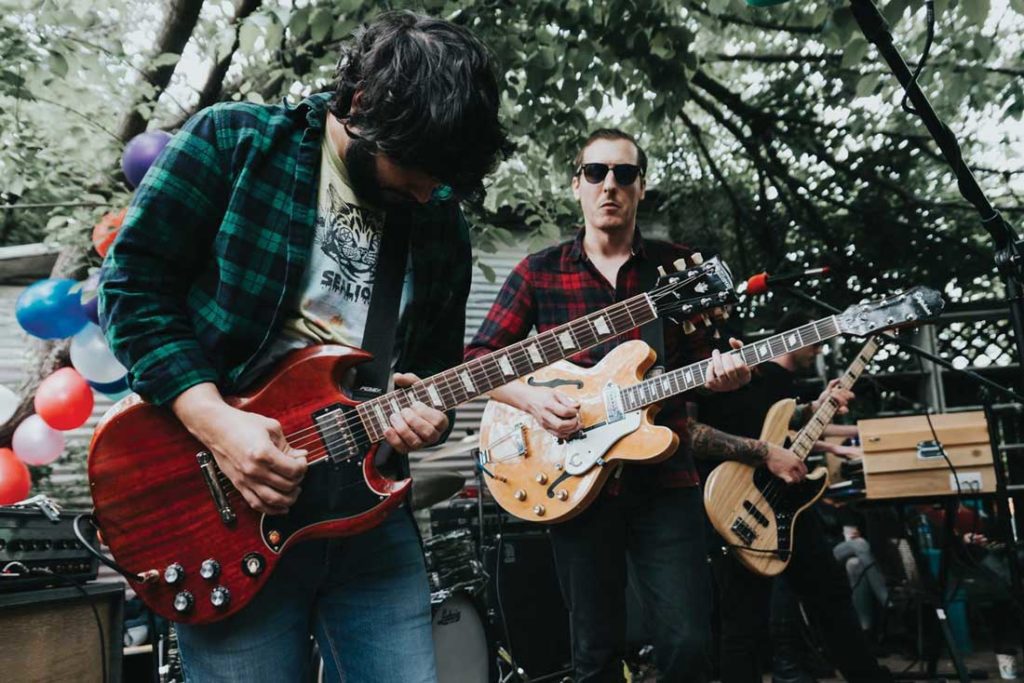
Williford is stoked about writing again: “I haven’t written a song in over five years. I’ve been a sideman in a lot of projects. I’ve over-extended myself, to the point where it’s been difficult to be creative. I’m kind of trying to re-prioritize. That’s why I had to leave [Pickett’s] band, because I couldn’t give him the time he needed, and I’m not that good a trumpet player. But it was about prioritizing and trying to find time not only to write with War Party but to be around and hang out again, because I felt like it was getting to the point where we would practice, and I would be like, ‘OK, gotta go home now.’ Same thing with [Moore]. His schedule was so busy, we weren’t seeing each other in any kind of social aspect. It was always, ‘All right, we’re here to work. Let’s get it done.’ And now it feels like more of an opportunity to [hang out] again.”
Despite the renewed vigor for making their next moves, War Party still has a brand new album to play and promote, though that cycle will be an enjoyable chore. They haven’t toured for several years, and they are all eager to hit the road. As a cofounder of Fort Worth’s Dreamy Life Records (Andy Pickett, Oil Boom, Loafers, Teenage Sexx, Siberian Traps), Smith is in the promo business by default, and he is more than ready to stuff Pure Destroyer into people’s ears as far and wide as possible. The band is planning a November tour with about-to-blow-up Dallas psych-rock collective Acid Carousel.
“Touring is absolutely the plan,” Williford said. “A lot of ridiculous life events happened while we were finishing this album, and I think we could’ve gone out on the road, but we didn’t really have a reason to if we hadn’t finished this record. … We also need to get on the road for no other reason than to solidify [Gage] in the band.”
With Pure Destroyer, War Party is clearly putting its past in a proverbial (and literal) album and either burying it in storage or dropping a lit match on it. But whatever obliterative metaphors you use, they’re treating this moment of closure as a starting point for the future. l



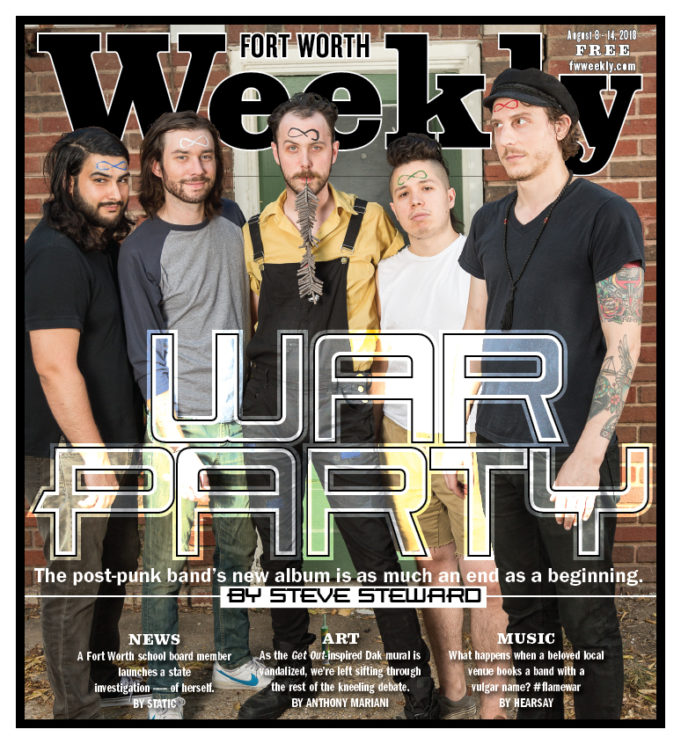
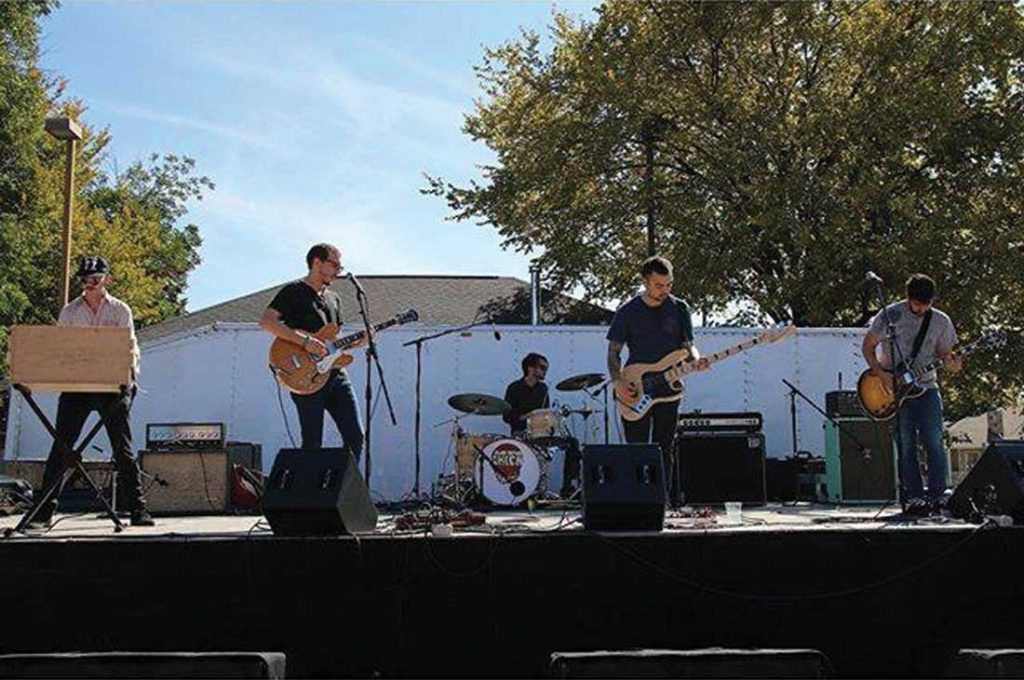









Major thanks for such a great and detailed story on one of FW’s best ever bands. Long live War Party. And thanks to Tyler Moore for the years of great music.